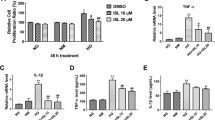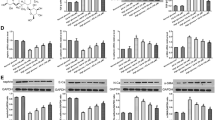Abstract
Objective
To elucidate the renoprotective effect of resveratrol (RSV) on sphingosine kinase 1 (SphK1) signaling pathway and expression of its downstream molecules including activator protein 1 (AP-1) and transformation growth factor-β1 (TGF-β1) in lipopolysaccharide (LPS)-induced glomerular mesangial cells (GMCs).
Methods
The rat GMCs line (HBZY-1) were cultured and randomly divided into 5 groups, including control, LPS (100 ng/mL), and 5, 10, 20 µmol/L RSV-treated groups. In addition, SphK1 inhibitor (SK-II) was used as positive control. GMCs were pretreated with RSV for 2 h and treated with LPS for another 24 h. GMCs proliferation was determined by 3-(4, 5-dimethylthiazol-2-yl)-2, 5-diphenyl tetrazolium bromide (MTT) assay. The proteins expression of SphK1, p-c-Jun and TGF-β1 in GMCs were detected by Western blot, and DNA-binding activity of AP-1 was performed by electrophoretic mobility shift assay (EMSA). The binding activity between RSV and SphK1 protein was detected by AutoDock Vina and visualized by Discovery Studio 2016.
Results
LPS could obviously stimulate GMCs proliferation, elevate SphK1, p-c-Jun and TGF-β1 expression levels and increase the DNA-binding activity of AP-1 (P<0.05 or P<0.01), whereas these effects were significantly blocked by RSV pretreatment. It was also suggested that the effect of RSV was similar to SK-II (P>0.05). Moreover, RSV exhibited good binding affinity towards SphK1, with docking scores of −8.1 kcal/moL and formed hydrogen bonds with ASP-178 and LEU-268 in SphK1.
Conclusion
RSV inhibited LPS-induced GMCs proliferation and TGF-β1 expression, which may be independent of its hypoglycemic effect on preventing the development of mesangial cell fibrosis and closely related to the direct inhibition of SphK1 pathway.
Similar content being viewed by others
References
Schrijvers BF, De Vriese AS, Flyvbjerg A. From hyperglycemia to diabetic kidney disease: the role of metabolic, hemodynamic, intracellular factors and growth factors/cytokines. Endocr Rev 2004;25:971–1010.
Migliorini A, Ebid R, Scherbaum CR, Anders HJ. The danger control concept in kidney disease: mesangial cells. J Nephrol 2013;26:437–449.
Zhao JH. Mesangial cells and renal fibrosis. Adv Exp Med Biol 2019;1165:165–194.
Meyerzu Heringdorf D, Jakobs KH. Renal mesangial cells: moving on sphingosine kinase-1. Br J Pharmacol 2007;150:255–257.
Geoffroy K, Troncy L, Wiernsperger N, Lagarde M, El Bawab S. Glomerular proliferation during early stages of diabetic nephropathy is associated with local increase of sphingosine-1-phosphate levels. FEBS Lett 2005;579:1249–1254.
Deng Y, Lan T, Huang J, Huang H. Sphingosine kinase-1/sphingosine 1-phosphate pathway in diabetic nephropathy. Chin Med J (Engl) 2014;127:3004–3010.
Lan T, Liu W, Xie X, Xu S, Huang K, Peng J, et al. Sphingosine kinase-1 pathway mediates high glucose-induced fibronectin expression in glomerular mesangial cells. Mol Endocrinol (Baltimore, Md) 2011;25:2094–2105.
Deng YH, Gong WY, Li Q, Wu X, Wu LY, Zheng XX, et al. Resveratrol inhibits high glucose-induced activation of AP-1 and NF-kappa B via SphK1/S1P2 pathway to attenuate mesangial cells proliferation and inflammation. J Funct Foods 2019;55:86–94.
Chang AS, Hathaway CK, Smithies O, Kakoki M. Transforming growth factor-β1 and diabetic nephropathy. Am J Physiol Renal Physiol 2016;310:F689–F696.
Shi GJ, Shi GR, Zhou JY, Zhang WJ, Gao CY, Jiang YP, et al. Involvement of growth factors in diabetes mellitus and its complications: a general review. Biomed Pharmacother 2018;101:510–527.
Gellings Lowe N, Swaney JS, Moreno KM, Sabbadini RA. Sphingosine-1-phosphate and sphingosine kinase are critical for transforming growth factor-beta-stimulated collagen production by cardiac fibroblasts. Cardiovasc Res 2009;82:303–312.
Liu X, Hong Q, Wang Z, Yu Y, Zou X, Xu L. Transforming growth factor-β-sphingosine kinase 1/S1P signaling upregulates microRNA-21 to promote fibrosis in renal tubular epithelial cells. Exp Biol Med (Maywood) 2016;241:265–272.
Leask A, Abraham DJ. TGF-beta signaling and the fibrotic response. Faseb J 2004;18:816–827.
Gressner AM, Weiskirchen R, Breitkopf K, Dooley S. Roles of TGF-beta in hepatic fibrosis. Front Biosci 2002;7:d793–d807.
Kitada M, Koya D. Renal protective effects of resveratrol. Oxid Med Cell Longev 2013;2013:568093.
Den Hartogh DJ, Tsiani E. Health benefits of resveratrol in kidney disease: evidence from in vitro and in vivo studies. Nutrients 2019;11:1624.
Kim MY, Lim JH, Youn HH, Hong YA, Yang KS, Park HS, et al. Resveratrol prevents renal lipotoxicity and inhibits mesangial cell glucotoxicity in a manner dependent on the AMPK-SIRT1-PGC1α axis in db/db mice. Diabetologia 2013;56:204–217.
Gowd V, Kang Q, Wang Q, Wang Q, Chen F, Cheng KW. Resveratrol: evidence for its nephroprotective effect in diabetic nephropathy. Adv Nutr 2020;11:1555–1568.
Flyvbjerg A. The role of the complement system in diabetic nephropathy. Nat Rev Nephrol 2017;13:311–318.
Dalla Vestra M, Saller A, Mauer M, Fioretto P. Role of mesangial expansion in the pathogenesis of diabetic nephropathy. J Nephrol 2001;14 Suppl 4:S51–S57.
Umanath K, Lewis JB. Update on diabetic nephropathy: core curriculum 2018. Am J Kidney Dis 2018;71:884–895.
Cani PD, Amar J, Iglesias MA, Poggi M, Knauf C, Bastelica D, et al. Metabolic endotoxemia initiates obesity and insulin resistance. Diabetes 2007;56:1761–1772.
Nymark M, Pussinen PJ, Tuomainen AM, Forsblom C, Groop PH, Lehto M. Serum lipopolysaccharide activity is associated with the progression of kidney disease in finnish patients with type 1 diabetes. Diabetes Care 2009;32:1689–1693.
Nan L, Huang M, Lai W, Jia R, Zheng Y, Yang L, et al. Impacts of the serum containing total flavonoids of Ajuga on rat glomerular mesangial cells. Mol Med Rep 2017;16:4895–4902.
Alemany R, van Koppen CJ, Danneberg K, Ter Braak M, Meyer Zu Heringdorf D. Regulation and functional roles of sphingosine kinases. Naunyn Schmiedebergs Arch Pharmacol 2007;374:413–428.
Gong W, Li J, Chen W, Feng F, Deng Y. Resveratrol inhibits lipopolysaccharide-induced extracellular matrix accumulation and inflammation in rat glomerular mesangial cells by SphK1/S1P2/NF-κB pathway. Diabetes Metab Syndr Obes 2020;13:4495–4505.
Huang K, Huang J, Chen C, Hao J, Wang S, Huang J, et al. AP-1 regulates sphingosine kinase 1 expression in a positive feedback manner in glomerular mesangial cells exposed to high glucose. Cell Signal 2014;26:629–638.
Shaulian E, Karin M. AP-1 as a regulator of cell life and death. Nat Cell Biol 2002;4:E131–E136.
Shaulian E, Karin M. AP-1 in cell proliferation and survival. Oncogene 2001;20:2390–2400.
Paugh BS, Bryan L, Paugh SW, Wilczynska KM, Alvarez SM, Singh SK, et al. Interleukin-1 regulates the expression of sphingosine kinase 1 in glioblastoma cells. J Biol Chem 2009;284:3408–3417.
Weigert C, Sauer U, Brodbeck K, Pfeiffer A, Häring HU, Schleicher ED. AP-1 proteins mediate hyperglycemia-induced activation of the human TGF-beta1 promoter in mesangial cells. J Am Soc Nephrol 2000;11:2007–2016.
Zhou P, Wan X, Zou Y, Chen Z, Zhong A. Transforming growth factor beta (TGF-β) is activated by the CtBP2-p300-AP1 transcriptional complex in chronic renal failure. Int J Biol Sci 2020;16:204–215.
Beach JA, Aspuria PJ, Cheon DJ, Lawrenson K, Agadjanian H, Walsh CS, et al. Sphingosine kinase 1 is required for TGF-β mediated fibroblastto-myofibroblast differentiation in ovarian cancer. Oncotarget 2016;7:4167–4182.
Author information
Authors and Affiliations
Contributions
Feng FZ, Gong WY and Deng YH performed the experiments and analyzed data in this study. Li SY performed a portion of the experiments. Feng FZ wrote the manuscript. Deng YH designed the study and revised the manuscript. All authors have read and agreed the final version for publication.
Corresponding author
Additional information
Conflict of Interest
The authors declare that there is no conflict of interests regarding the publication of this paper.
Supported by the National Natural Science Foundation of China (No. 81603355, 81900745)
Rights and permissions
About this article
Cite this article
Feng, Fz., Gong, Wy., Li, Sy. et al. Inhibitory Effect of Resveratrol on LPS-induced Glomerular Mesangial Cells Proliferation and TGF-β1 Expression via Sphingosine Kinase 1 Pathway. Chin. J. Integr. Med. 29, 500–507 (2023). https://doi.org/10.1007/s11655-022-3530-y
Accepted:
Published:
Issue Date:
DOI: https://doi.org/10.1007/s11655-022-3530-y




